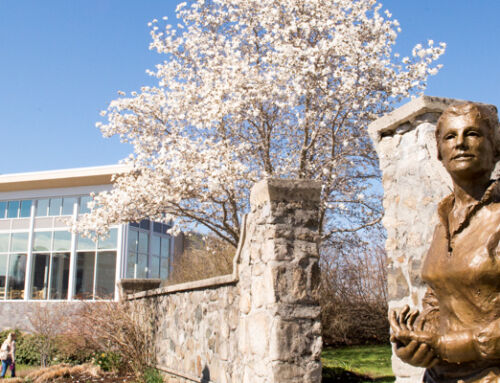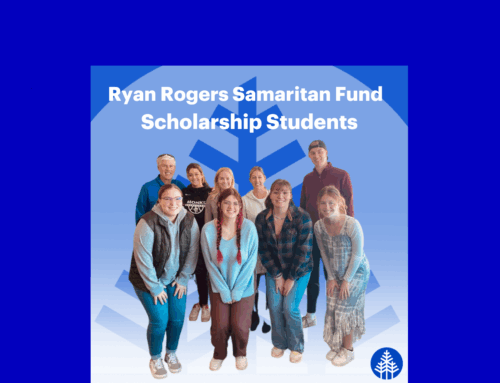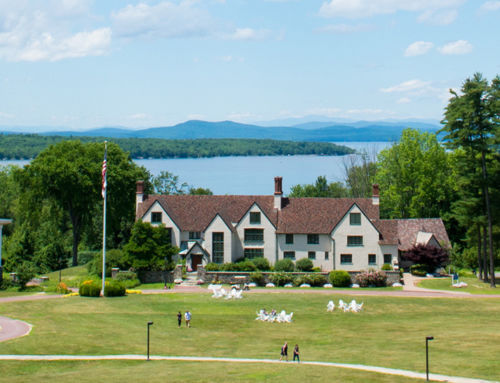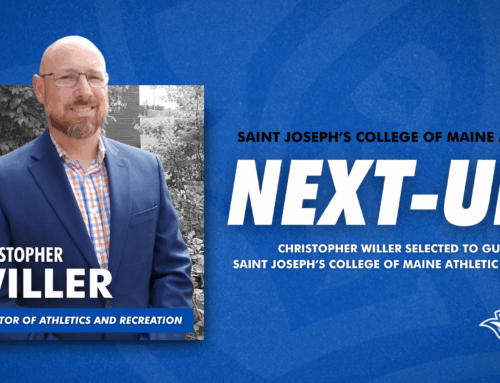Supportive environments create lifelong connection
by Dr. Marion Young
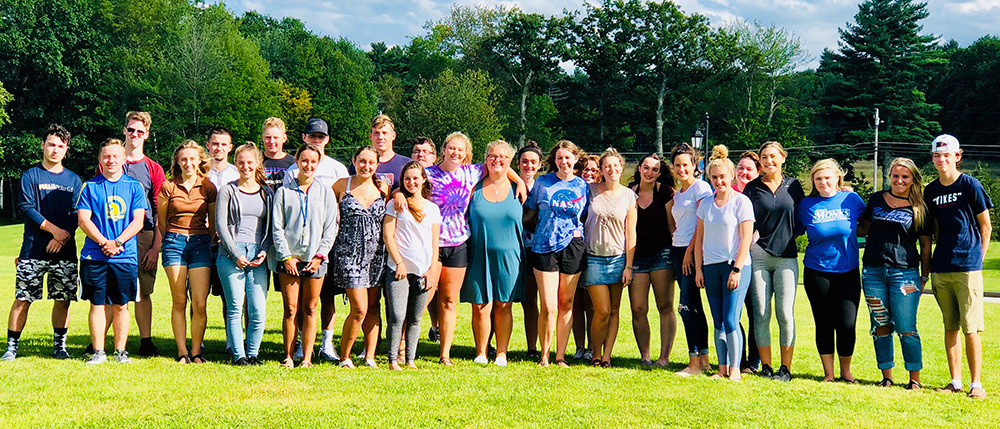
First Year Experience (FYE) Seminar helps students transition to college life. This photo features members of the Class of 2022. Photo: courtesy of Dr. Marion Young.
The psychological definition of a cohort is a group of individuals who enter an environment at the same time. The most common cohort is a birth cohort, but psychological research has begun to shift the focus of cohort to individuals in a group who are bonded by common experiences. A sound argument can be made that when freshmen Move-In Day occurs in August, that as soon as they drive onto Mercy Way those individuals become part of a cohort, a group that will be bonded by common experiences both inside and outside the classroom. This bonding will take place by creating connections with other students, faculty, and staff.
Through creating these cohorts we are empowering students by challenging them and supporting them, giving them a place to “start from” as they graduate and become members of the larger human community.
These connections will provide the student with different forms of support and challenges as they are introduced to individuals who have had different experiences and inevitably offer different perspectives than the student. Their cohort becomes what Dr. Robert Kegan, professor in Adult Learning at Harvard Graduate School of Education, describes as a “holding environment” (1982, 1994). A holding environment serves three functions. First, the environment must “hold well,” meeting a student’s needs by affirming who the student will become and providing them with the supports they need to be successful in that transition (Kegan, 1982, 1994). Next, a good holding environment will “let go,” by challenging students and providing the encouragement to grow beyond the walls of the classroom by potentially altering their perceptions of the world. Finally, a good holding environment does “stick around” providing constancy to the person throughout the growth process (Kegan, 1982, 1994).
These concepts of “holding well,” “letting go,” and “sticking around” may sound very familiar as most individuals would claim that these three characteristics of a “good holding environment” are also qualities of a good family. And that is exactly what our cohort of students become here at Saint Joseph’s College—a community, a family. Their SJC family provides each student with the opportunity to grow and excel in their chosen academic and personal pursuits. This growth is enhanced by the support systems students find with each other and with other members of the college community, including faculty and staff. This network of connections creates a second family that “holds well” over their four years at SJC, “lets go” upon graduation, but continues to “stick around” as students stay connected to the friends and the college that have become not just a cohort, but a family, a home.
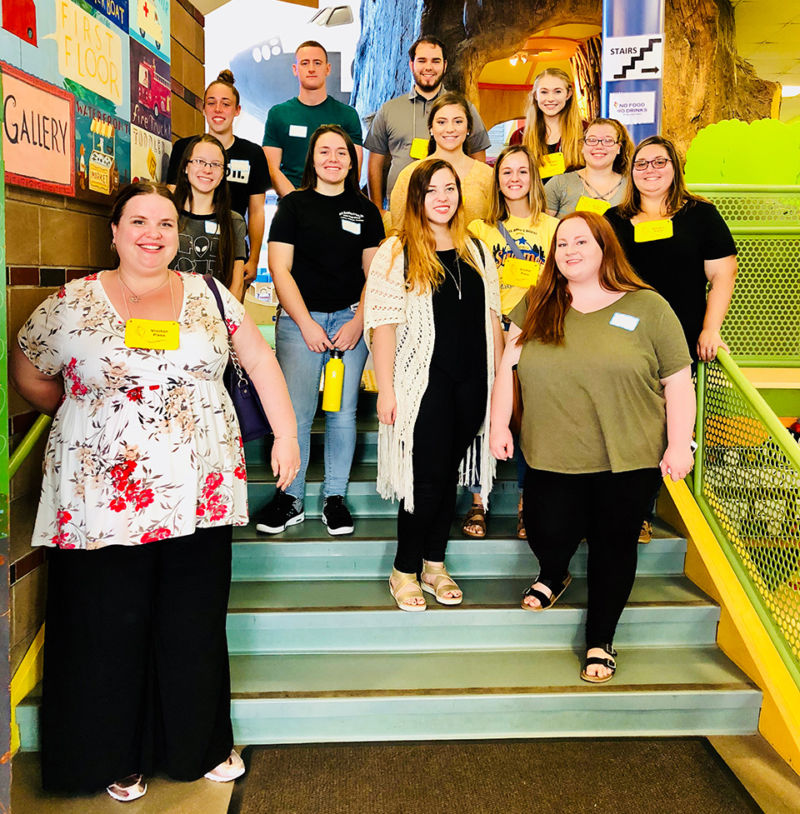
Dr. Marion Young's Child Development course after they had taken a tour of the Portland Children’s Museum and Theatre of Maine.
This idea of creating a college community that feels like a home that “holds well” is never more evident than in the classes offered here at SJC. Pictured are students from one of the 13 sections of First Year Experience (FYE). The FYE course is designed to support freshmen as they transition to college life. The incoming freshmen are supported not only by the faculty and staff members who teach the course, but also peer mentors. The peer mentors are upperclassmen whose job description includes aiding the instructors of the FYE class. In the photo, taken during the first week of the fall of 2018 semester, a group of 26 freshmen had just completed an activity called Step into the Circle with their peer mentor Mary Claire Attisano and it is evident from their faces how excited they are to become part of the SJC family.
The second photo is of my own Child Development course after they had taken a tour of the Portland Children’s Museum and Theatre of Maine in September 2018. Too often, students do well on tests, but fail to see any connections between their learning in the classroom and the larger world. Psychology does not occur in a vacuum, so I encourage my students during a semester-long course project to get out there and make connections, and see psychology in action! With that in mind, this project is designed to give students a chance to “let go” and put their psychological knowledge and skills to work in our community by constructing an educational and interactive museum exhibit, and test its effectiveness via classroom presentations.
The power of the cohort to create lasting connections is also to be further investigated in a grant from the National Science Foundation—Dr. Steve Jury (PI), Dr. Johan Erikson (Co-PI), and myself (Co-PI). The primary focus of the NSF grant is to fund the SJC Science Scholars Program, a program designed to encourage academically-talented students, who have demonstrated financial need, to enter into and succeed in a community of young scientists. Additionally, I am interested in examining how the new Science Scholars Program, with a combination of cohort bonding and progressive engagement, will impact how students learn and their academic self-efficacy in STEM majors.
T.S. Eliot once wrote, “Home is where one starts from.” My hope for SJC is that through creating these cohorts we are empowering students by challenging them and supporting them, giving them a place to “start from” as they graduate and become members of the larger human community.
References
Kegan, R. (1982). The Evolving Self: Problems and Process in Human Development. Cambridge, MA: Harvard University Press.
Kegan, R. (1994). In Over Our Heads: The Mental Demands of Modern Life. Cambridge, MA: Harvard University Press.
